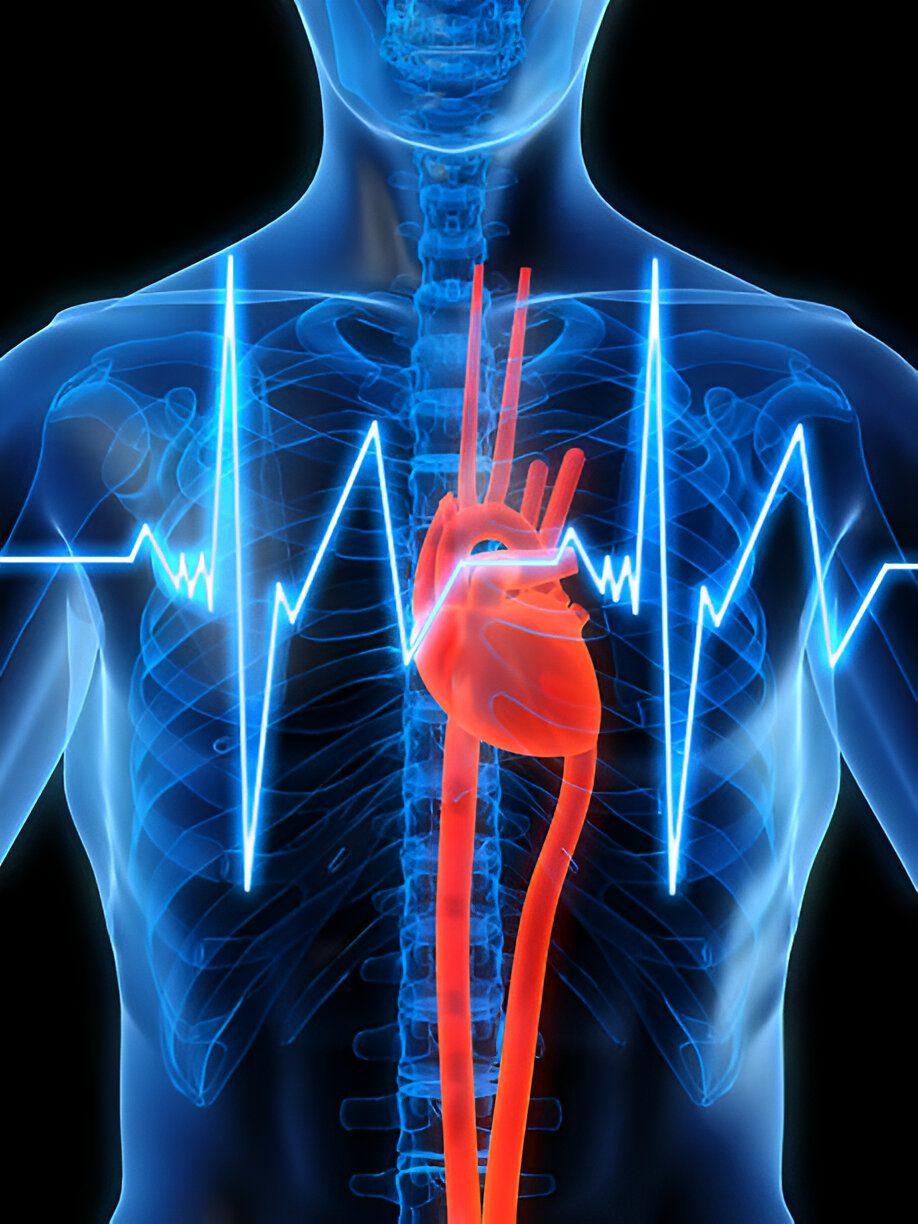A Heart Too Heavy to Bear
Grief is commonly seen as an emotional burden, but it also places tremendous strain on the body—particularly on the heart. Studies connect deep sorrow with cardiovascular health risks, sometimes manifesting as Broken Heart Syndrome (Takotsubo Cardiomyopathy). Recognizing this link can empower those in mourning to protect their well-being even as they navigate profound loss.
When Grief Strains More Than the Soul

The Science Behind Grief and Heart Health
Grief triggers a surge of stress hormones like cortisol and adrenaline, directly impacting the cardiovascular system:
✔ Elevated Blood Pressure & Heart Rate – Stress hormones can increase heart rate and blood pressure, overburdening the heart.
✔ Heightened Inflammation – Persistent sorrow and stress correlate with raised inflammatory markers, a risk factor in heart disease.
✔ Irregular Heart Rhythms – Some grieving individuals report palpitations or arrhythmias, potentially escalating the danger of cardiac incidents.
Those with pre-existing heart conditions may be especially vulnerable, but even healthy hearts can weaken under extreme emotional duress, sometimes leading to Broken Heart Syndrome.
What is Broken Heart Syndrome?
Takotsubo Cardiomyopathy—often termed Broken Heart Syndrome—is a sudden, typically temporary condition in which acute emotional distress results in severe weakening of the heart’s left ventricle.
Key Symptoms:
✔ Chest pain (mimicking a heart attack)
✔ Shortness of breath
✔ Fainting or dizziness
✔ Irregular heartbeat
✔ Left ventricle dysfunction (seen in imaging tests)
Though treatable in many cases, Broken Heart Syndrome can be life-threatening, particularly for older adults or those with existing heart issues.
Who is at Risk?
Certain groups face higher chances of heart complications related to grief:
✔ Older Adults – The loss of a long-term partner or spouse can significantly elevate cardiac risks.
✔ Women – Particularly postmenopausal women, due to hormonal shifts affecting heart function.
✔ Individuals with Pre-existing Heart Conditions – Hypertension, arrhythmias, or other cardiovascular issues raise susceptibility.
✔ Highly Stressed Individuals – Those already coping with chronic stress, anxiety, or depression may be more vulnerable.
Healing Over Time: Finding Hope After Loss
Grief, while painful, isn’t permanent in its most acute form. Over time, emotional resilience and careful heart-conscious strategies can foster both mental and physical healing:
✔ Creating Rituals of Remembrance: Simple traditions or tributes can soothe the heart.
✔ Maintaining Connections: Avoid isolation—talk with friends, engage in support networks, or volunteer.
✔ Reimagining Life After Loss: Holding loved ones’ memories while allowing yourself to continue living meaningfully.
“When sorrow weighs on the heart, remember that love—though painful—can also mend and fortify it, one gentle beat at a time.” — Felicity R.
Coping with Grief While Protecting Your Heart
1. Recognizing Signs of Heart Distress
Seek Medical Attention: If chest pain, breathlessness, or irregular heartbeat persist, consult a doctor—do not attribute it solely to “stress.”
2. Managing Stress and Emotional Well-being
Therapy & Support Groups: Sharing sorrow in a guided setting can reduce emotional strain.
Mindfulness & Relaxation Techniques: Meditation, gentle breathing, or muscle relaxation can stabilize stress hormone levels.
Journaling: Writing out fears, regrets, or memories aids in processing pain and unburdening the heart.
3. Prioritizing Heart Health
Regular Exercise: Low-impact activities like walking or yoga bolster cardiovascular endurance while easing emotional tension.
Heart-Friendly Diet: Emphasize omega-3-rich fish, leafy greens, and whole grains to support overall wellness.
Adequate Sleep: Grief often disrupts rest; consistent bedtimes and calming routines boost recovery.
Limit Alcohol & Stimulants: Excess caffeine or alcohol can worsen heart symptoms; moderation is vital.
4. Seeking Medical Support
Regular Check-Ups: For those at risk, consistent medical supervision can track heart changes during grief.
Medications When Necessary: Beta-blockers or anti-anxiety meds may assist in managing strain during acute mourning phases.
Personal Anecdote: The Day My Heart Skipped a Beat
When Emma lost her spouse of 35 years, sadness gripped her intensely. But what frightened her most was the sharp, radiating chest pain she experienced weeks later. Initially dismissing it as stress, Emma visited the ER at her daughter’s insistence. There, doctors diagnosed Broken Heart Syndrome—her overwhelming grief had physically compromised her heart. With medical attention and emotional support, Emma recovered. Now, she openly shares her story in grief support circles, reminding others that heartbreak can indeed hurt the heart, urging them to seek help when distress turns physical.
Things To Try This Week
Schedule a Heart Check-Up:
- If you’re grappling with deep grief, especially as an older adult or someone with heart concerns, talk with a healthcare provider about monitoring your cardiovascular health.
Practice a Stress-Reduction Technique:
- Spend five minutes a day on mindful breathing or a calming app that steadies your pulse and lowers tension.
Create a Small Memory Corner:
- Place a photo, a candle, or a token of your loved one in a quiet space. Use it as a gentle prompt for reflection and emotional release.
Conclusion
Grief can profoundly impact heart health, sometimes culminating in Broken Heart Syndrome—a testament to how deeply love and sorrow intertwine.
Yet with informed care—both medical and emotional—it’s possible to protect and strengthen the heart amidst life’s most devastating farewells. By acknowledging grief’s physical toll, seeking help when needed, and honoring the memory of those we’ve lost, we transform heartbreak into a gentler path toward hope and healing. 💙
Grief and heartache often go hand in hand, reminding us how intricately the mind and body intertwine. As you navigate the pain of losing a loved one, remember that caring for your heart—emotionally and physically—is an act of self-preservation and love.
Explore our cherish collections below for resources, gentle keepsakes, and comforting insights, guiding you through the healing process with compassion and hope.
More Reflections, More Growth
Loss is complex, and the road to healing is different for everyone. These reflections offer insight, support, and guidance as you navigate this journey.
The Physical and Emotional Symptoms of Grief: Understanding the Whole-Body Impact
Grief affects both the mind and the body, leading to emotional struggles and physical symptoms like fatigue, sleep disturbances, and aches. This guide explores the signs of grief and offers coping strategies for managing its impact on your emotional and physical well-being.
Disenfranchised Grief: Mourning Losses That Society Overlooks
Disenfranchised grief refers to mourning losses that society does not acknowledge, making the grieving process more difficult. This guide offers strategies to validate and cope with grief when your loss is not openly recognized or supported.
The Grief Before Goodbye
Anticipatory grief occurs before a loved one’s passing and involves emotional preparation for loss. This guide explores the unique challenges of anticipatory grief, offering strategies for emotional support, self-care, and creating lasting memories with loved ones.
The Five Stages of Grief: A Comprehensive Guide
The five stages of grief—denial, anger, bargaining, depression, and acceptance—are a well-known framework for understanding the emotional journey of loss. This guide delves into each stage, explaining how grief unfolds and emphasizing the personal nature of the grieving process.
The Science of Sorrow: What Happens in the Brain When We Grieve
Grief isn’t just an emotional experience—it’s a biological one that rewires the brain. This guide explores the science behind grief, shedding light on how the brain processes loss and adapts to life after a loved one’s passing.
The Invisible Line Between Grief and Depression
Grief and depression can overlap, but understanding the key differences is crucial. This article explores how grief is a natural response to loss, while depression is a mental health condition, offering guidance on when grief may need additional support.
Becoming Whole Again: Rediscovering Yourself Post-Heartbreak
Heartbreak reshapes your identity and opens a door to profound self-discovery. This guide helps you embrace solitude, reconnect with your passions, and grow into a stronger, more authentic self.
From Heartache to Renewal: Healing After a Relationship Ends
Healing after a relationship ends is a journey of self-discovery and growth. This guide offers practical steps to process grief, rebuild confidence, and embrace a fulfilling new chapter.
When Love Hurts: Grieving the End of a Relationship
Heartbreak grief is a profound response to love lost. This guide explores its emotional and psychological impact, offering compassionate strategies for healing and renewal.
Explore Journeys of Healing and Solace:
Discover dedicated spaces that offer understanding, guidance, and connection through grief. From the loss of loved ones to life’s challenging transitions, each category provides a pathway to reflect, connect, and find peace in shared experiences.


























